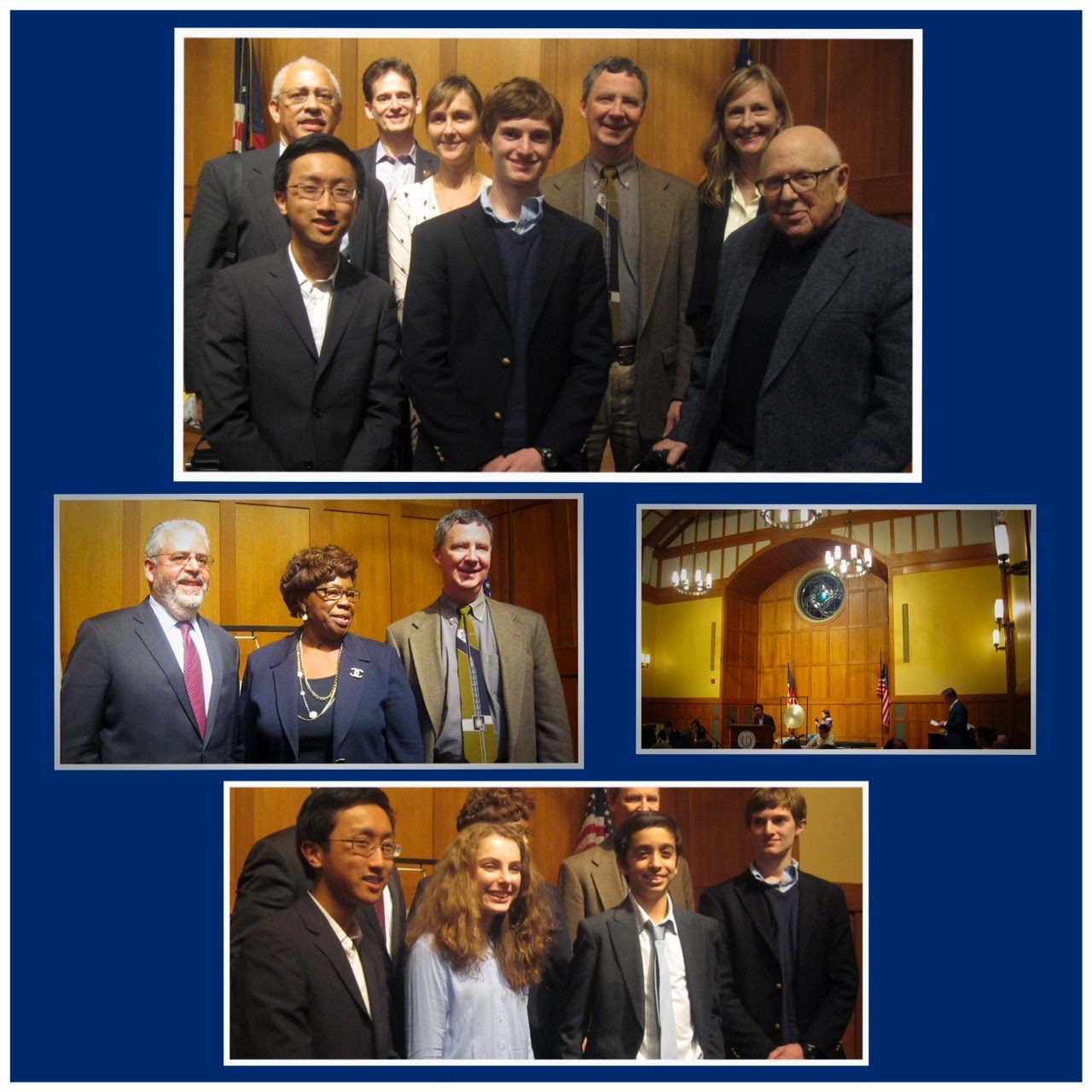Yale won the debate this year in the 18th annual Westchester Debate Competition Nov. 7 at Hackley School in Tarrytown, barely beating teams from Brown and Princeton. Debate Night, 2014, included the three college teams, followed by six Westchester high-school teams. Prizes for high-school teams are funded by YWAA's William Nightingale '53 Debate Fund.
Nightingale himself and Susan Kaminsky '86, co-Chairs of the Debate from the Yale side, kicked off the competition, thanking Hackley for being the host site this year, for providing sufficient heat on a windy, chilly Friday night, and for scrambling to fetch more seats to accommodate a larger-than-expected crowd. Parents, students, and local alumni from Yale, Princeton, and Brown huddled into the hall to listen to political wisdom from a current Ivy League generation.
Richard Bradley '86, editor-in-chief at Worth magazine, was moderator for the event. (His biggest challenge, he'd admit, was to make sure the young appointed gong-bangers (to signal to debaters to wind up) didn't bang the gong too loudly.) The evening's judges included two local judges from Greenburgh Town Court, Judge Walter Rivera and Judge Delores Scott Brathwaite, and Joseph Modica from Brown. That Judge Brathwaite's husband is a Yale alumnus wouldn't have impact on her decisions, she promised.
The college topic was a challenge, as it would be even for the Washington politicians who must confront the issue everyday: Should the U.S. lead military intervention to thwart the aggressions of the Islamic State (ISIS)? Debaters from Yale, Brown and Princeton would decide, plan and plot the U.S.'s overall strategy--in just one evening.
The Yale team presented arguments discouraging intervention in any meaningful way. Tony Nguyen '16 from Chandler, Ariz., explained there are three defined reasons for when military intervention is necessary, and this was not one of them. Zachary Young '17 from Cincinnati, rising to the podium as if he were a Speaker of the House, followed Nguyen with supplementary reasons. They argued that other nations or groups in the region with greater stakes should take lead roles.
The Princeton team (sophomores Nathan Raab of Rye and Janelle Tam of Waterloo, Ontario) argued for limited military intervention, and Diego Arene-Morley, a junior at Brown from Washington, D.C., reasoned there are times when intervention is necessary, and this could be one of those times.
Back and forth, the teams went. They rebutted, they argued, and they sermonized. They mulled over the logic of their foes and responded with facts, trends, and bits of history. Sometimes they politely rebuffed requests from their opponents to interject or intervene. Arene-Morley of Brown concluded that conflicts are usually about people or ideologies, and this is about people.
Perhaps unlike Washington, when all presentations were done, members from all three teams, amiable and respectful, smiled and congratulated each other.
In the end, the judges had to make a call. They conferred and explained their criteria. Judge Brathwaite said they didn't focus on the sides the teams took. They focused on presentation, poise, speech, and grasp of the topic.
Yale was pronounced the 2014 winner, seizing the crown from Brown, which won last year in Rye Brook. Arene-Morley was also a member of that Brown team. (Yale, Harvard and Brown competed in the 2013 debate. Princeton replaced Harvard on the bill this year.) At Yale, Nguyen is an ethics, politics and economics major. Young is studying economics.
High-school debaters took the stage afterward and followed the leads of their college mentors. College teams had coached the high-school students during intermission, before they debated. Teams featured students from Briarcliff High School, Hackley School, Harrison High School, Mamaroneck High School, the Master's School (Dobbs Ferry), and Yonkers (Lincoln High School and Palisades Prep).
They had to tackle tough topics, too, and marched one by one to the podium to present their cases loud enough to keep the audience alert, passionate enough to keep the crowd amused. It was all business for the high schools, as well. Two teams stepped to the front, sporting business suits and attache' cases.
High-school topics included arguing for or against reducing the voting age to 16, arguing for or against requesting criminal background information in job applications ("dropping the box," the debaters called it), and arguing for or against penalties for certain types of hate speech.
The judges pronounced host-school Hackley the high-school winner, with Briarcliff Manor and Mamaroneck as runners-up. Give them credit. The judges, sitting on the front row and taking notes, were just as attuned to the student arguments as they were in listening to lawyer presentations in real cases in town court. After the competition, judges spoke privately to students, advising them on what works (and what doesn't) and patting them all on the backs for jobs well done.
The event's organizers, besides Kaminsky and Nightingale, also included Modica and Amanda Nash from the Brown alumni group in Westchester, Martin Sklar from Princeton-Westchester and Tracy Williams '79 from YWAA.
 |
| Brown's Diego Arene-Morley makes his point (top R), Princeton and Rye's Nathan Raab (bottom R) follows with arguments. Yale's Tony Nguyen '16 takes his turn (middle L). (YWAA photos) |
 |
| YWAA board members and Debate co-Chairs Susan Kaminsky '86 and Bill Nightingale '53 kick off the evening (R). Richard Bradley '86 (top L) acted as debate moderator. |
 |
| High-school and college debaters gather at the end of the evening (top). The judges listen closely to debate points from high-school students (bottom R). |





No comments:
Post a Comment